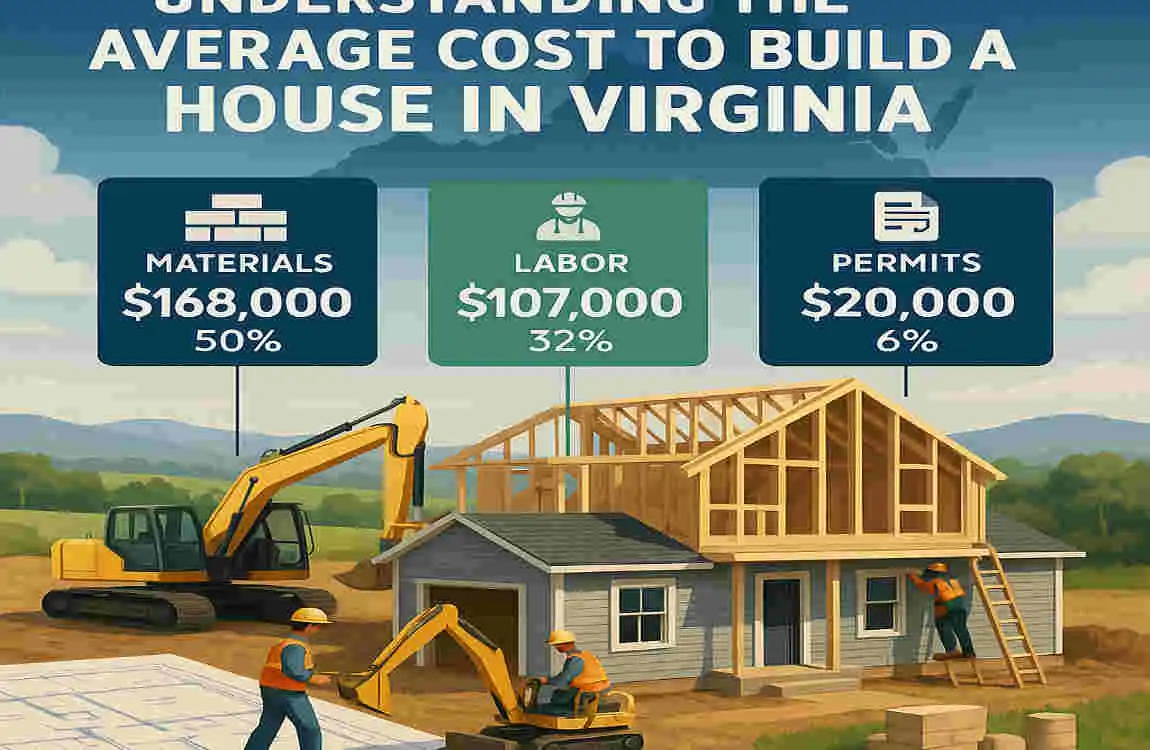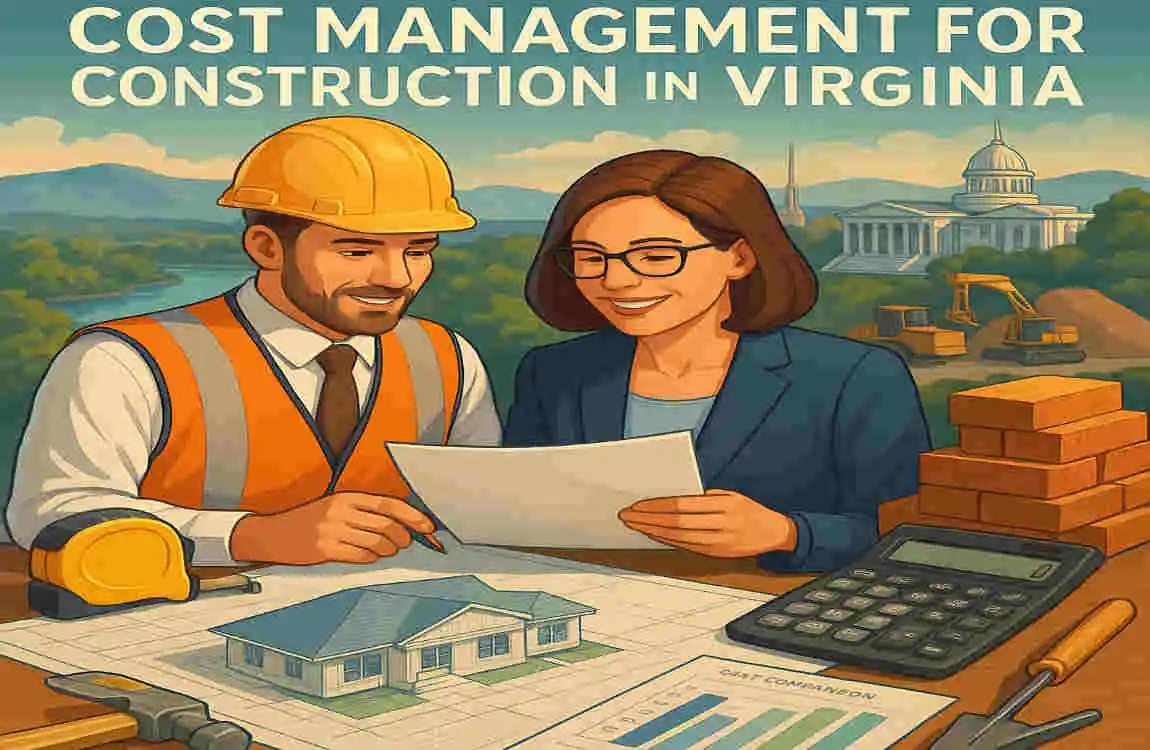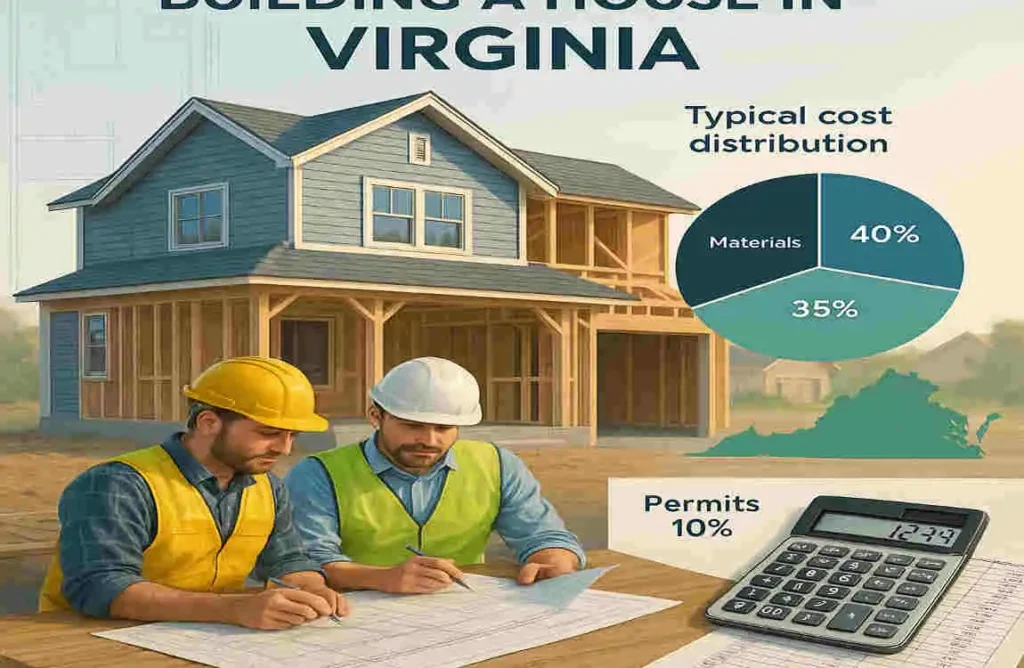Building a house is one of the most significant investments you’ll ever make. If you’re in Virginia, getting a clear picture of the total cost house upfront can save you from nasty surprises down the road. Whether you’re a first-time homebuyer dreaming of a custom build or a seasoned builder looking to expand, understanding that every penny matters. That’s why we’re diving deep into how much it costs to build a house in Virginia – a question that’s on many minds in the Old Dominion.
Think about it: the total cost isn’t just about bricks and mortar. It includes hidden fees, location quirks, and even the weather’s impact on your timeline. By breaking it all down, you’ll feel more in control.
Understanding the Average Cost to Build a House in Virginia

When pondering the cost of building a house in Virginia, starting with averages provides a solid foundation. Right now, in 2025, the typical cost per square foot to build a home in Virginia ranges from $120 to over $200. This isn’t a one-size-fits-all number – it swings based on where you are and what you’re building.
For an average-sized home, measuring around 2,000 to 3,000 square feet, the total price tag might range from $200,000 to $550,000. That’s a broad range. It accounts for everything from basic starter homes to more luxurious setups. In bustling areas like Northern Virginia, expect to pay on the higher end due to high demand and limited land availability.
Let’s compare this to buying an existing house. In cities like Virginia Beach house, the median home price hovers around $350,000, while building from scratch could cost $300,000 for a similar size, but with full customisation. Head to Richmond, and a building might run you $250,000 to $400,000, often cheaper than buying in hot markets. Up in McLean, where luxury is king, how much does it cost to build a house? In Virginia, it can easily top $1 million for high-end builds, making buying a pre-existing mansion sometimes a more affordable option.
Why these differences? Virginia’s diverse regions play a significant role. Coastal spots like Virginia Beach often deal with flood zones, which can drive up costs, while rural areas typically offer bargains. If you’re weighing your options, consider your lifestyle – do you prefer a beach view or a quiet countryside retreat?
Major Cost Components When Building a House in Virginia
Building a house involves piecing together many elements, each with its own price. Let’s unpack the big ones, starting with the land itself. By understanding these, you’ll see how they add up to your total.
Land Costs in Virginia
First things first: you need a spot to build on. In Virginia, land costs average $14,000 to $24,000 per acre, but that’s just the starting point. In urban hubs like Arlington or Fairfax, you pay double or triple that for a prime location close to jobs and schools.
Location matters a ton. Rural areas in the Shenandoah Valley offer affordable land, sometimes priced under $10,000 per acre, with ample space for expansive designs. However, in high-demand areas like Virginia Beach, expect higher premiums due to the presence of ocean views and increased tourism. Ask yourself: Do you prioritise convenience or affordability?
Don’t overlook extras. Land preparation – like clearing trees or grading the soil – can add $5,000 to $20,000. Inspections for environmental issues or surveys may incur an additional $1,000. Factor these in early to avoid budget shocks.
Permits and Legal Fees
Before you break ground, paperwork comes into play. Virginia requires various permits, such as building, HVAC, plumbing, and electrical permits. These ensure your home meets safety codes and can cost $500 to $1,000 or more per permit, depending on your local rules.
In places like Richmond, fees may be straightforward, but in stricter Northern Virginia counties, expect higher costs and more bureaucratic hurdles. Why include them early? Skipping this step could delay your project and inflate expenses. Plan – contact your local building department to get exact figures.
Legal fees, like hiring a lawyer for contracts or zoning checks, add another layer. Budget $1,000 to $5,000 here. It’s not glamorous, but it’s essential for a smooth build.
Material Costs
Materials form the backbone of your home’s cost. On average, they run about $50 per square foot in Virginia. This covers everything, from the basics to the advanced features.
Break it down: lumber for framing typically accounts for 10-15% of your material budget, especially given recent price fluctuations. Roofing, siding, and insulation follow, each adding $10,000 to $30,000 to the cost of a mid-sized home. Then come windows, flooring, cabinets, and countertops – choices here can make or break your wallet.
Opt for premium granite countertops? That could boost costs by 20%. Stick with budget laminates, and you save big. Remember, Virginia’s climate – humid summers and cold winters – means investing in sound insulation pays off in energy savings later. What materials excite you most?
Labour Costs and Contractor Fees
People power your build, and in Virginia, labour isn’t cheap. Hourly rates vary: plumbers and electricians might charge $75 to $150 per hour, while carpenters charge around $50 to $100.
Contractors often work on a fixed price or a percentage of the total build, say 10-20%. In labour-tight markets like Northern Virginia, fees climb due to high demand. Factors such as union rules or skilled worker shortages can also influence this.
To manage, get multiple bids. A good contractor coordinates everything, saving you headaches and stress. Have you thought about interviewing a few?
Structural and Foundation Costs
Your home’s base sets the tone. Foundation work in Virginia costs $6 to $37 per square foot, depending on type – slab, crawl space, or full basement.
Framing follows, with an average cost of $20,000 to $50,000. Soil conditions matter: rocky areas in the Blue Ridge Mountains may require additional engineering, which can increase prices. Complex designs, such as multi-story homes, also contribute to this.
Choose wisely – a sturdy foundation prevents future repairs. What’s your soil like?
Interior and Finishing Costs
Now for the fun part: making it feel like home. Drywall and painting can cost between $10,000 and $20,000, while flooring adds $15,000 for standard options.
Cabinetry, fixtures, and appliances vary wildly. Standard finishes might total $50,000, but high-end choices, such as custom kitchens, could double that amount. HVAC and plumbing installations? Expect to pay between $10,000 and $30,000, tailored to Virginia’s specific weather needs.
Balance quality and cost – splurge on what you’ll use daily, like a comfy kitchen.
Additional Costs That Affect the Total Building Cost
Beyond the basics, sneaky expenses can creep in. Let’s shine a light on them so you’re prepared.
Utility hookups, such as connections to power, water, and sewer, may cost build house between $ 5,000 and $15,000. Inspections ensure everything’s up to code, adding a few hundred bucks.
Landscaping and exterior work, including driveways, patios, and gardens, can range from $10,000 to $50,000. It’s not just curb appeal; it’s functional too.
Always set aside a contingency fund, typically 10-15% of your total budget, to cover surprises such as weather delays or material price hikes. Financing costs, such as loan interest and insurance during construction, add up – budget 5-10% for these expenses.
These extras take a good plan and turn it into a great one. Have you accounted for them?
Here’s a quick list of common additional costs:
- Utility connections: $5,000-$15,000
- Landscaping: $10,000-$50,000
- Contingency fund: 10-15% of total
- Financing and insurance: 5-10% extra
How to Calculate Your Estimated Total Cost
Ready to crunch numbers? Let’s make this straightforward. Start by deciding your home’s size – say, 3,000 square feet.
Next, estimate per-square-foot costs by using $150 as the average for Virginia. That gives a base of $450,000. Add land: $20,000 for an acre. Permits: $2,000. Materials: $150,000 (at $50/sq ft). Labour: $100,000. Structural: $50,000. Interiors: $75,000. Extras: $50,000. Total? Around $747,000.
For accuracy, use online calculators from sites like HomeAdvisor or get local builder quotes. Plug in your specifics – location, quality level, and add-ons.
Let’s illustrate with a table for a 3,000 sq ft home:
Cost Component Estimated Cost Notes
Land $20,000 Average acre in rural VA
Permits $2,000 Basic fees
Materials $150,000 $50/sq ft
Labor $100,000 Contractor and trades
Structural/Foundation $50,000 Basic setup
Interiors/Finishing $75,000 Standard options
Additional Costs $50,000 Utilities, landscaping
Total $447,000 Before contingency
Adjust for your needs – add 10% contingency to hit $491,700. Tools like these make the costs of building a house in Virginia less mysterious.
Break it into steps: 1. Measure size. 2. Research local rates. 3. Sum components. 4. Add buffers.
Tips for Managing and Reducing Building Costs in Virginia

You don’t have to blow your budget. Wise choices can shave thousands off.
Select the correct location: rural lots can cut land costs by half compared to those in cities. Avoid flood-prone areas to avoid the need for extra insurance.
Opt for cost-effective materials, such as recycled lumber or energy-efficient windows, which can save money in the long term without compromising quality.
Negotiate with contractors – get bids and haggle. Time your build for off-seasons, such as winter, to avoid peak prices.
Consider modular homes: prefabricated parts assemble faster, reducing labour by 20-30%.
Here’s a list of top tips:
- Shop around for land: Compare urban and rural options.
- Opt for efficient designs: Simple layouts lower structural costs.
- DIY where possible: Handle painting or landscaping yourself.
- Monitor market trends: Buy materials during dips.
These strategies keep things affordable. Which one will you try first?
Why the Cost to Build a House in Virginia May Vary
Costs house aren’t set in stone – they fluctuate. Regional differences are huge: Northern Virginia’s $200+/sq ft vs. Southwest’s $120.
Custom designs jack up prices: unique features add 20-30%. Supply chain issues, such as lumber shortages or inflation, can increase material costs by up to 10%.
Local regs vary too – stricter codes in urban areas mean more fees. Track these to budget smartly.
When to Consider Buying vs Building in Virginia
Building offers customisation, but buying is quicker. Average build cost: $300,000-$500,000, with a timeline of 6-12 months. Buying: $350,000 median, closing in weeks.
Pros of building: tailored to you, potential savings on energy features. Cons: stress and delays. Buying wins on speed but lacks personalisation.
In Virginia, if you want quick moves in growing areas like Richmond, buy. For dream homes in McLean, build. Weigh your priorities.
